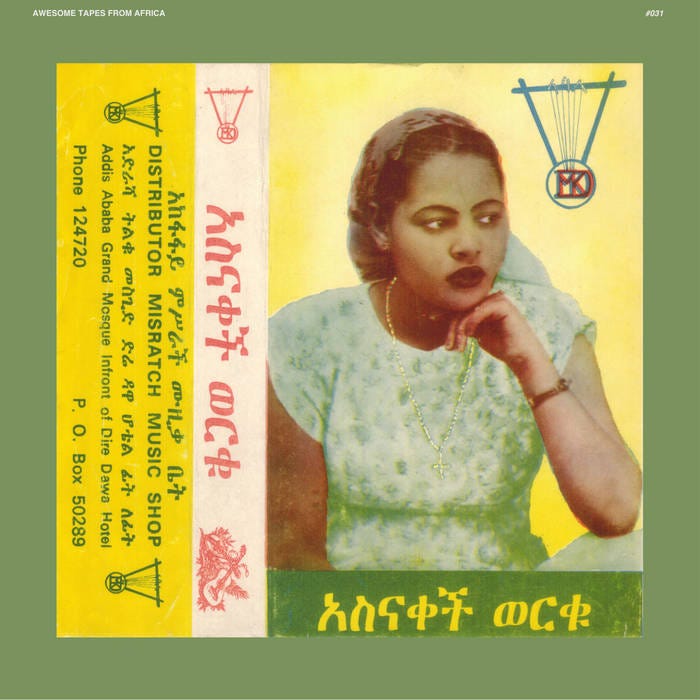EVERY GENRE PROJECT - September 15 - Azmari
Genre of the Day - Azmari 🇪🇹🇪🇷
Album of the Day - Asnakech by አስናቀች ወርቁ (Asnaketch Worku) (1975)
The other day, I saw a TikTok of a woman wholly aghast at a series of bars from one of the songs Drake recently data-dumped into the world. In the song “Blue Green Red,” the rapper makes the head-scratching choice of spending a whole verse naming women from different Ethiopian ethnic groups. One wonders what goes through his head in light of these songs being inevitably weighed against Kendrick Lamar’s evisceration of the accused colonizer, but that’s not the point. The point is that I share a birthday with Drake, and I am yet another man born on October 24th giving attention to Ethiopia in a musical sense today, and I hope with more grace.
https://www.tiktok.com/t/ZP8epY8gT/
Azmari is another reminder of how music was experienced before its industrialization and organization via companies. Like yeterday’s urtiin duu, one can unfurl the thread of azmari through millennia of Ethiopian and Eritrean history. The name is inextricably linked to the countries’ music; azmari simply translates to “singer” in Amharic, denoting a class of traveling, singing female and male bards. Historians believe that the azmari tradition dates from before the country’s Christian days, hence why it has remained a secular lyrical tradition developing in parallel to the country’s zema liturgical chants. This distinction is key: according to Ashenafi Kebede, a composer and musicologist, liturgical music is thought to be of the highest artistic merit and refinement. Being an azmari, then, is something of a punk act in Ethiopian culture, left to those with no other options. A sense of emo defeatism so often cultivated by singer-songwriters across musical cultures rings very true in the azmari context. In response to being asked why he chose to become an azmariwoch, one singer was quoted saying: “‘cause I am a failure, and I can do nothing else better.”
Azmaris have traditionally moved nomadically, rarely weighed down by the artistic guilds or familial connections of parallel traditions in other cultures. They performed in tej-bets, honey-wine drinking bars, parties, and celebrations. Azmaris have often faced divaphobia—owing to their occasionally establishment- and church-critical skews, they’re seen as fussy and ungrateful to those who accommodate their performances. Nonetheless, their merit stands in their clever and razor-sharp insights of social life, the Ethiopian nobility, and the human experience. The sem-enna-werq poetic tradition, for example, ingeniously hides its themes in double entendres, indicating an incisive grasp of linguistic storytelling capabilities. Ever the lonely geniuses, azmaris typically accompany themselves with a five-string krar lyre or a one-string masenqo fiddle.
Perhaps this was a particularly perceptive genre for me to absorb today, as I’m buying a guitar tomorrow—I’m now thoroughly primed and excited to wallow in my personal solitary instrumental loserdom. Asnaketch Worku scored her first krar at only 25 cents, a humble beginning for a woman who would shine as one of the country’s best and most outspoken touring artists picking up the mantle of the azmari tradition for an Ethiopian era plagued by dictatorship. 1975’s አስናቀች ወርቁ (Scorned Gold) is a transfixing display of her talent. “Jinyew” [“Genie”] sets the tone with her low but gentle alto swirling refracted through layers of recording smokes as an organ beneath swirls with the melodic intricacy of a Fibonacci sequence. Her krar ripples a refined intrigue in “Tche Belew,” [“What’s Going O”] tight note clusters leaping from her deft hands. The space-age synths seamlessly melting into the krar on “Baynelay Yidal” [“He Walks Over My Head”] is genuinely one of the best musical moments I’ve experienced all year as I walked through a misty LA night gazing at the alien palms. The album is proof of azmari as a high art, one that empowers its participants as much as it engulfs listeners in its poetically engrossing lyrics and melodies.





